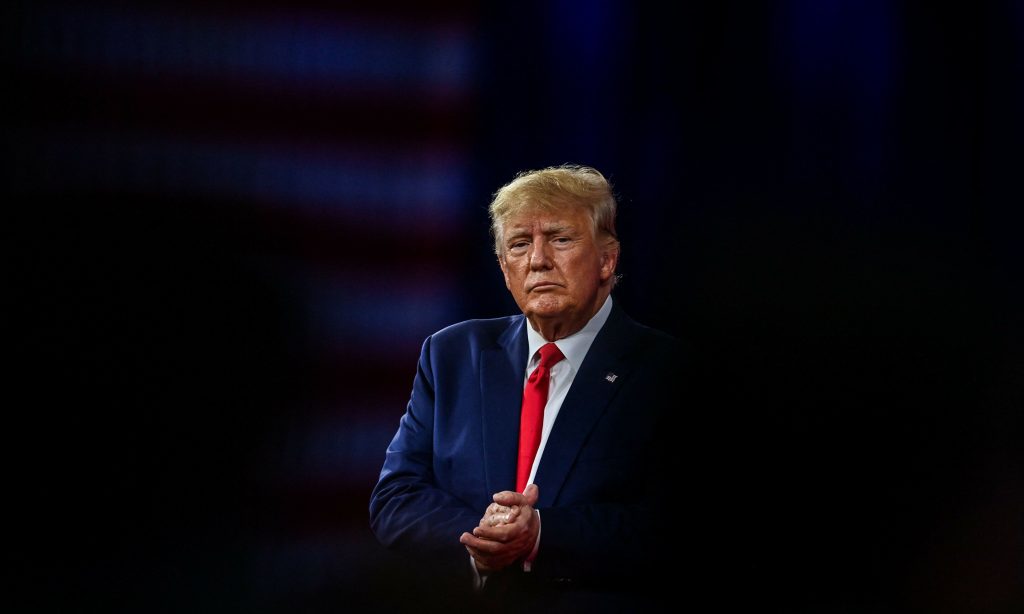Atlanta: Donald Trump and 18 allies were indicted in Georgia Monday for scheming to overturn his 2020 election loss in the state, with prosecutors turning to a statute normally associated with mobsters to accuse the former president, lawyers and other top aides in a sweeping criminal conspiracy aimed at keeping him in power.
The 97-page indictment details dozens of acts by Trump and his allies to undo his defeat in the battleground state, including hectoring Georgia’s Republican secretary of state to find enough votes to keep him power, pestering officials with bogus claims of voter fraud and attempting to persuade Georgia lawmakers to ignore the will of voters and appoint a new slate of electoral college electors favorable to Trump. It also outlines a scheme to tampering with voting machines in one Georgia county and steal data.
“Trump and the other Defendants charged in this Indictment refused to accept that Trump lost, and they knowingly and willfully joined conspiracy to unlawfully change the outcome of the election in favor of Trump,” says the indictment issued Monday night by the office of Fulton County District Attorney Fani Willis.
Other defendants included former White House chief of staff Mark Meadows; Trump’s personal attorney Rudy Giuliani; and a Trump administration Justice Department official, Jeffrey Clark, who advanced his efforts to undo his election loss in Georgia. Multiple other lawyers who devised legally dubious ideas aimed at overturning the results, including John Eastman, Sidney Powell and Kenneth Chesebro, were also charged.
Willis said the defendants would be allowed to voluntarily surrender by noon August 25. She also said she plans to ask for a trial date within six months.
The document describes the former president of the United States, the former White House chief of staff, Trump’s attorneys and the former mayor of New York as members of a “criminal organization” who were part of an “enterprise” that operated in Georgia and other states — language that conjures up the operations of mob bosses and gang leaders.
The indictment bookends a remarkable crush of criminal cases — four in five months, each in a different city — that would be daunting for anyone, never mind a defendant simultaneously running for president.
It comes just two weeks after the Justice Department special counsel charged him in a vast conspiracy to overturn the election, underscoring how prosecutors after lengthy investigations that followed the Jan. 6, 2021 riot at the US Capitol have now, two-and-a-half years later, taken steps to hold Trump to account for an assault on the underpinnings of American democracy.
The sprawling web of defendants in the Georgia case — 19 in total — stands apart from the more tightly targeted case brought by special counsel Jack Smith, which so far only names Trump as a defendant.
The Georgia case also stands out because, unlike the two federal prosecutions he faces, Trump would not have the opportunity to try to pardon himself if elected president or to control the outcome by appointing an attorney general who could theoretically make it go away.
As indictments mount, Trump — the leading Republican candidate for president in 2024 — often invokes his distinction as the only former president to face criminal charges. He is campaigning and fundraising around these themes, portraying himself as the victim of Democratic prosecutors out to get him.
Republican allies once again quickly rallied to Trump’s defense. “Americans see through this desperate sham,” House Speaker Kevin McCarthy wrote on the platform formerly known as Twitter.
The counts against Trump include violating the state’s Racketeer Influenced and Corrupt Organizations, or RICO, act as well as other crimes such as conspiracy to commit forgery and conspiracy to commit false statements.
The indictment charges Trump with making false statements and writings for a series of claims he made to Georgia Secretary of State Brad Raffensperger and other state election officials January 2, 2021, including that up to 300,000 ballots “were dropped mysteriously into the rolls” in the 2020 election, that more than 4,500 people voted who weren’t on registration lists and that a Fulton County election worker, Ruby Freeman, was a “professional vote scammer.”
The indictment also mentions the now infamous Dec. 18, 2020, session in the Oval Office, where Trump allies including Sidney Powell and Michael Flynn, the former national security adviser, proposed ordering the military to seize voting machines and appoint a special prosecutor to investigate allegations of voter fraud in Georgia and other crucial states Trump had lost.
Prosecutors say the meeting at the White House, which included Giuliani, was part of an effort to “influence the outcome” of the election. Days later, prosecutors say, Meadows traveled to Cobb County and attempted to observe a signature match audit being performed “despite the fact that the process was not open to the public.” Several state officials prevented the then-chief of staff from entering the prohibited area.
AP
